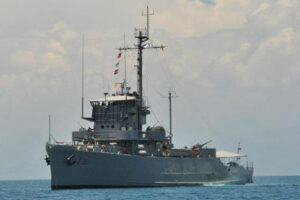Philippines, US scrap live-fire naval drill after old ship sinks in rough seas

By Kenneth Christiane L. Basilio, Reporter
PHILIPPINE-US forces canceled a live-fire drill on Monday after a decommissioned Philippine Navy vessel sank in waters near Zambales province facing the South China Sea hours before it could be targeted in their annual Balikatan (shoulder-to-shoulder) exercise.
The World War-II era ship BRP Miguel Malvar (PS-19) sank on Monday morning due to rough sea conditions while being towed to an area where the Philippines and US had planned to fire at it using anti-ship missile systems and military jets, their forces said in a joint statement.
“Prior to towing the target vessel to the operational area, the BRP Miguel Malvar underwent environmental cleaning and preparation for the marstrike,” they said, referring to the planned maritime strike drill.
More than 14,000 Filipino and American troops are participating in the Balikatan exercise, held in areas of the Philippines facing regional flashpoints like the South China Sea and Taiwan, and featuring advanced US missile systems. It began on April 21 and will run until May 9.
Their forces have practiced how to repel an invasion in western and northern Philippines and held naval drills with allies like Australia within the country’s exclusive economic zone in the South China Sea.
They were also supposed to sink the BRP Miguel Malvar with the use of the Philippines’ FA-50 fighter jets, A-29B turboprop attack aircrafts, fast-attack ships and its anti-ship cruise missile system, while the US planned to use its F-16 and F-18 fighter jets.
Despite the ship’s sinking, the Philippines and US said the maritime strike exercise “remains unaffected” because they would continue with virtual naval strike missions to rehearse command and control operations in a wartime scenario.
“The training will integrate ground, maritime and air-based sensors and shooters into a combined, joint fire network, as the Philippine and US joint task forces exercise command and control while increasing combined warfighting capability,” they said.
Meanwhile, a detachment of Philippine marines led the joint amphibious landing exercises in Palawan province, where they simulated a beach landing and tactical retake of an island as part of Balikatan drills, the Armed Forces of the Philippines said in a separate statement.
The Philippines and US held the drills with Australian forces, while troops from Japan and the United Kingdom served as observers.
“It showcased the growing interoperability and cohesion among partner nations in maintaining regional security,” the Philippine military said.
Also on Monday, the Philippine Army said it is prepared to provide support to the police and Commission on Elections by deploying more than 16,000 troops nationwide across checkpoints and polling precincts during the midterm elections on May 12.
About 9,700 troops would be stationed at more than 63,000 election stations nationwide, with 6,700 troops deployed throughout election checkpoints, it said in a separate statement. An additional 12,300 troops are on standby for possible deployment.
“Our troops have undergone rigorous orientation on their roles during this critical democratic exercise,” General Roy M. Galido, commanding general of the Philippine Army, said in the statement.
China’s coast guard last week said it conducted law enforcement patrols around the disputed Scarborough Shoal and nearby waters in the South China Sea.
The coast guard said it had strengthened patrols since the start of April, and carried out tracking, surveillance and interception operations “in accordance with laws and regulations,” according to a report from a Chinese military news website.
It said it had warned and expelled “illegal vessels” that veered within its waters to protect China’s sovereignty and interests, China Military Online reported on April 30.
Tensions between the Philippines and China over the South China Sea have worsened in the past year as Beijing continues to assert its sweeping claims, including on Scarborough Shoal, a key fishing ground claimed by both nations that it has controlled since 2012.
Chinese patrols around Scarborough Shoal coincide with the Balikatan exercise, which seeks to improve interoperability and preparedness to address shared regional security concerns. Beijing has said the drills are provocative.
Started in 1991, the Balikatan exercise has evolved into Southeast Asia’s premier combat rehearsal as the Philippines and US seek to strengthen security cooperation and enhance force interoperability in response to China’s growing assertiveness in the region.




